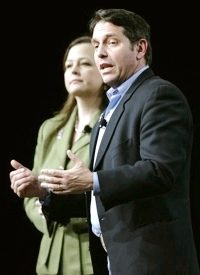
Mark Meckler, co-founder of the Tea Party Patriots, is the organizer behind Thursday’s “Continuing Revolution” rally at the Capitol, and said that:
We expect to see a bunch of frustrated, angry patriots who want to see serious cuts to government spending. I think it’s a huge gut check. This is a way for us to judge [our congressmen] and see how serious they are and to prepare for the 2012 elections.
Tea Party-supported candidates promised during last fall’s campaign to cut the federal budget by at least $100 billion. So far, negotiations between the Republican-controlled House (with at least 50 new representatives who were propelled there by the energy of the Tea Party) and the still-Democrat-controlled Senate has stalled somewhere between $30 and $60 billion.
Key speakers at the rally included Reps. Michelle Bachmann (R-Minn.), Mike Pence (R-Ind.), and Senate Minority Leader Mitch McConnell (R-Ky.). In his prepared remarks, McConnell told the rally:
In my view, the tea party has already had an overwhelmingly positive impact on the most important issues of the day. It’s helped focus the debate. It’s provided a forum for Americans who felt left out of the process to have a voice and make a difference. And it’s already leading to good results.
Meckler is not so sure, which is part of the reason he’s backing the rally. He considers a cut of anything less than the promised $100 billion to be a failure of the Tea Party. One of the rally’s speakers, Andrew Langer, president of the Institute for Liberty, agrees:
The idea that the Democrats think it is reasonable to offer up less than 1 percent of the budget in budget cuts — Americans, I think, are ready to shut down the government over something as insulting as that…
The [Democrat-proposed] $30 billion in cuts is not only nothing, it is an insult to every American who is hungering for meaningful change in D.C. Even [the Republican-proposed] $61 billion is an insult. Americans have wanted change for three election cycles and fighting to get to 1 percent of the budget is an insult to all of these people.
Rep. Blake Farenthold (R-Texas), who is one of the Tea Party freshmen, is also frustrated: “I’ve never been in politics before, and I am amazed at the snail’s pace at which stuff moves in Washington, D.C. So I understand their frustration and impatience, but I also see the other side of it — that you have 100 people in the Senate to deal with and 435 people in the House of Representatives to deal with and at least one person in the White House to deal with. ”
The frustration is beginning to show up in the polls. On March 30, CNN announced its Opinion Research Survey that showed 32 percent of the public has a favorable view of the Tea Party movement, down 5 points from December. Those who have an unfavorable view of the Tea Party, according to the poll, are 47 percent, up 4 points from December, and 21 points from January 2010.
The CNN pollsters were quick to point out, however, that the Tea Party numbers matched those of both the Republican and Democrat parties. As further explanation for the drop in public favor by the Tea Party, CNN Polling Director Keating Holland said, “It looks like the rise in the movement’s unfavorable rating has come mostly among people who make less than $50,000. It’s possible the drop among lower income Americans is a reaction to the Tea Party’s push for large cuts in government programs that help lower-income Americans…” Also noted is that the poll covered just 1,023 people, and had a “sampling error” of plus or minus three percentage points.
Michael Barone, writing at Investors.com, gave encouragement to those frustrated with the lack of progress so far in Washington. He noted the success of Wisconsin Governor Scott Walker in beginning the process of reining in the power of public unions, observing that Wisconsin has already stopped withholding union dues from workers’ paychecks. Barone reminded his readers of the success Governors Chris Christie (New Jersey) and Bob McDonnell (Virginia) are having by showing some backbone and standing up strongly to the vested interests in those states.
[Voters] have seen that vast spending increases haven’t generated jobs, and they understand that tax increases can choke a sputtering economic recovery. Given the facts, they understand that public employee unions inflate spending, reduce accountability and operate as a mechanism for the involuntary transfer of taxpayer money to one political party.
The press won’t make that case. Republicans and Tea Partiers need to do it themselves.
It is well to remember that the 112th Congress was inaugurated on January, and this is only early April. A bill to repeal ObamaCare has already passed the House, while much debate continues over the budget cuts. The defining moment for the Tea Party may just be around the corner. At the rate the federal government is spending money, it will hit the debt ceiling possibly as soon as (appropriately) April 15. With pressure from constituents and reminders such as the “Continuing Revolution” rally, supporters of limited government, balanced budgets, and the Constitution may just be able, at long last, to begin to have an impact on the fiscal direction of the country.
Photo: Tea Party Patriots national co-founders Mark Meckler, right, and Jenny Beth Martin address members at the Tea Party’s convention Feb. 25, 2011, in Phoenix.: AP Images



